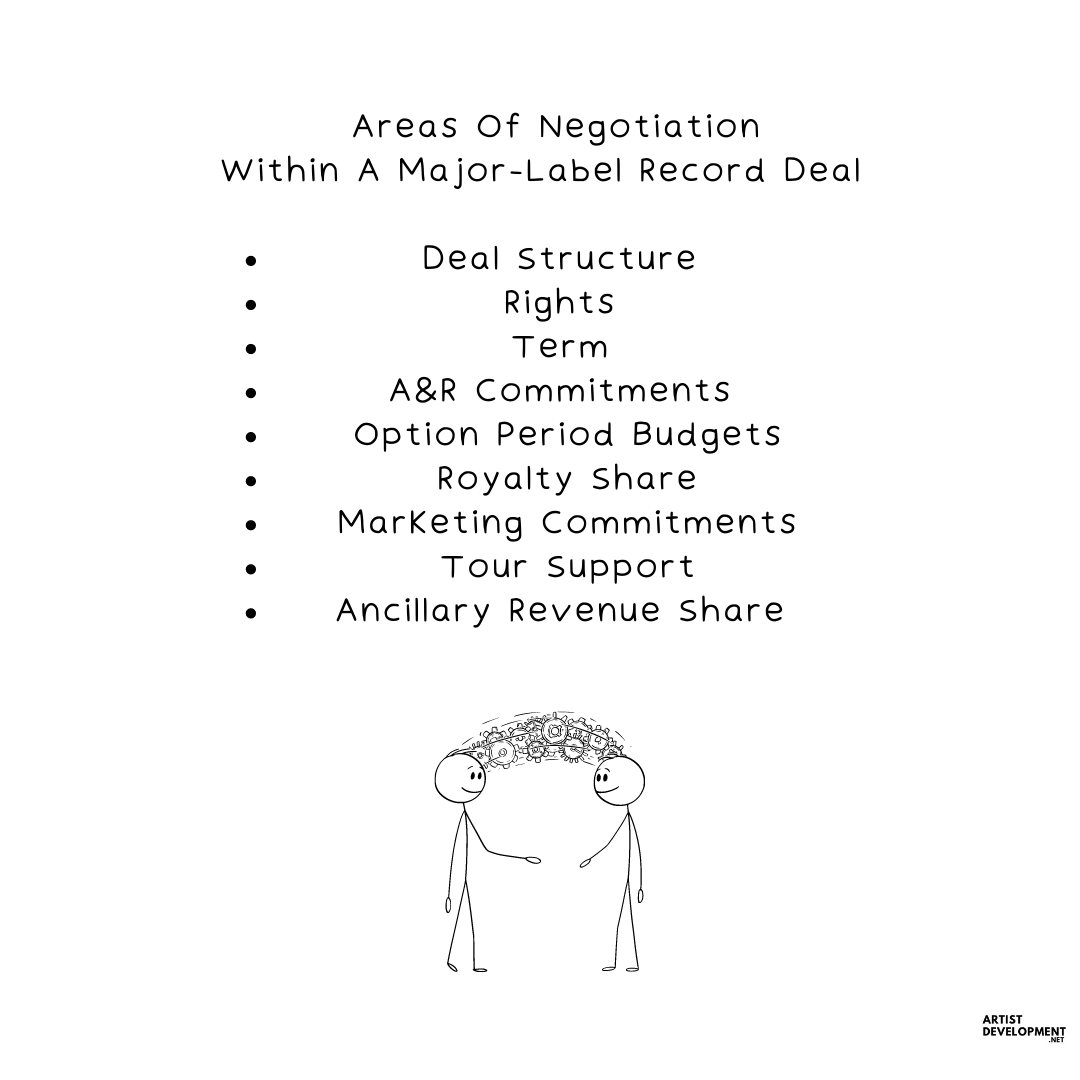💡✍️ADN #040: Staying Indie vs. Signing With A Major
Aug 27, 2023Hey Friends -
Welcome to the Artist Development Newsletter.
Every Sunday, I send an email providing actionable tips for artists and industry on one area of the music business.
Last week, we talked about how a photobooth is helping to capture 10,000 new email addresses.
You can re-read last week’s newsletter here if you want to refresh.
Today, we will look inside a major label record deal to weigh the pros and cons of signing a contract as an independent artist.
Here we go.
— — -
A sense of validation and security comes with signing a record deal.
It’s similar to other scenarios, like being picked as the lead in the school play or being named QB1 of the football team.
Historically, signing a major-label record deal implies you are officially a professional in the music industry.
But, increasingly, independent artists can afford to retain ownership and stay truly independent longer because of the tools at their disposal.
For Example -
- You can learn to record your music on a free program like GarageBand.
- You can master your records on a cheap tool like Landr for the price of a couple of beers per month.
- You can release unlimited music on a platform like Tunecore at a maximum of $50 a year.
While doing this, you can improve your skills and processes to create a consistent cadence of releases, which helps build awareness, trust, and loyalty within your growing audience.
There has never been a better time to afford to develop on your own in the music business.
In the past, I’ve spoken about the “2 For 1” strategy to separate you, the artist, and your music.
As the artist, you own the rights to your name, likeness, and everything that comes with it.
On behalf of your record label, you release and own the rights to your recordings.
Suppose you rinse and repeat, releasing music while growing your touring business with consistent visits to your growing markets.
In that case, you can command better terms if and when major labels come knocking at your door.
Often, even with all of these affordable tools at an independent artist’s disposal, there is a fascination with signing a record deal.
The most common reason is $$$, plain and simple.
The first question you must ask yourself is why you want to sign a deal.
- Is it because the tools at your disposal aren’t good enough, and you need a budget to record another way?
- Is it because you want a larger team around you to market your music?
- Is it because you want your music on the radio?
The second question is, do you understand what you will be trading for those opportunities in the form of ownership and revenue share?
Record deals are all about leverage.
“The more leverage you have as an independent artist, the better the deal you can command.”
Here are the common areas of negotiation within a major-label record deal -
- Deal Structure — Sign directly or via the artist’s label entity
- Rights — Term + License Of (X) Amount Of Years
- Term — Option Periods, Track Delivery Requirements
- A&R Commitments — Advances + Recording Budgets
- Option Period Budgets
- Royalty Share
- Marketing Commitments
- Tour Support
- Ancillary Revenue Share — Touring, Merchandise, Ticketing, Publishing, etc.
The more leverage you have (ticket sales, streaming numbers, video views, social media followers, etc.), the better the deal you can command.
Example:
If you’re streaming 10 million times a month on Spotify, that is 40k per month a label can project as earnings upon signing you.
This means you have the leverage to multiply that # and say, “It’s going to cost you x if you want to work together.”
Every area where you can build your value will allow you to command a better deal.
I suggest focusing solely on growth until you’re at the point where you can command a major-label deal.
At the point you are offered, it’s up to you to decide if what is put on the table is worth the ownership you’ll have to give up or if you want to continue betting on the path you’re building as an independent artist.
You are the only one who can wake up and decide whether you want more or need less; it’s your decision alone.
Minute by minute, hour by hour, day by day, week by week, month by month, year by year, and decade after decade.
Choose your path not out of the desire for validation but because it provides the proper infrastructure for yourself and your career.

See you next Sunday!
Neil Mason
PS — I’ve added a couple of mini E-Books to the website.
They are free, so grab them!
Artist Development Tips For Songwriters
How To Schedule 1 Month Of Social Media In 1 Day
— — -
Did you enjoy this week’s newsletter?
Please share it with someone you think would enjoy it, too!
If you haven’t already, you can subscribe to the newsletter here.